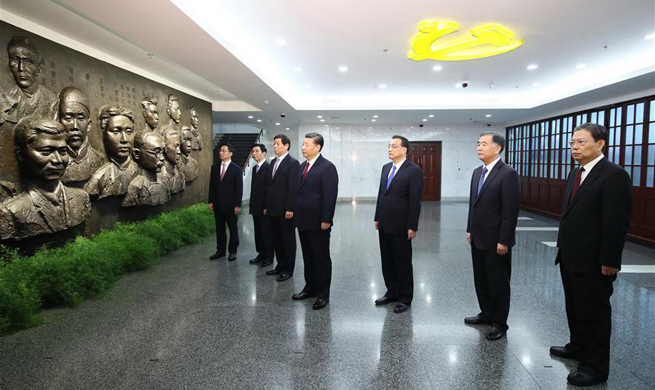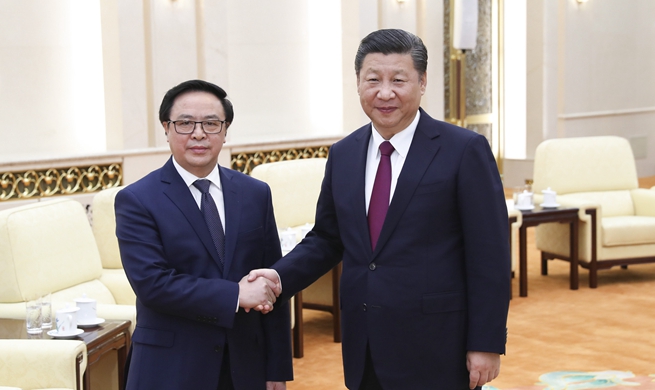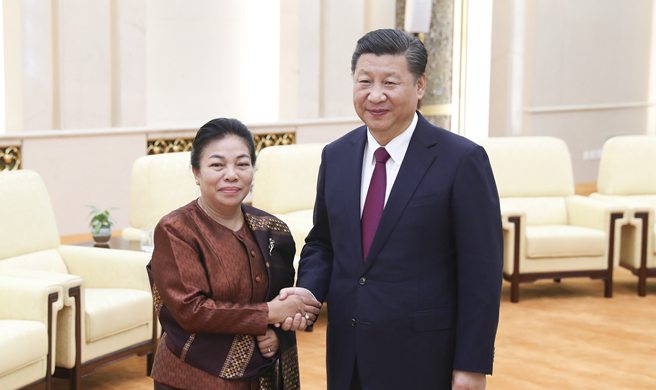TOKYO, Oct. 31 (Xinhua) -- The Bank of Japan (BOJ) on Tuesday maintained its current monetary policy and gave an upbeat view of the country's economy although lowered its inflation outlook for fiscal 2017 as it's 2 percent inflation target remains elusive.
The central bank said in a statement after its two-day meeting that it is maintaining the short-term interest rate at minus 0.1 percent and the target for the 10-year government bond yield at zero percent.
The BOJ did, however, lower its inflation forecast for fiscal 2017 to 0.8 percent from an earlier estimate of 1.1 percent as economic improvement has yet to translate into notable wage growth or increased private consumption.
The central bank also decided to maintain its powerful monetary easing measures to continue pursuing its 2-percent inflation target, it said after the conclusion of its two-day policy meeting, despite other central bank's moves to rein in monetary policy, including from the European Central Bank and the U.S. Federal Reserve.
In its outlook report, the BOJ said the country's economy will expand a real 1.9 percent in the fiscal year through March, upgraded from the July forecast of 1.8 percent growth.
Japan's economy has grown for six consecutive quarters with expansion expected to continue, yet the BOJ's lofty 2 percent inflation target still remains some way off, with core inflation standing at just 0.7 percent in September, according to the central bank's data, compounded by what has been described as the Japanese public's "deflationary mindset."
The BOJ cut its inflation forecast for fiscal 2017 through next March to 0.8 percent from an earlier projection of 1.1 percent, in its quarterly outlook report.
The central bank also downwardly revised its inflation projection for fiscal 2018 to 1.4 percent from 1.5 percent, but maintains it will still hit its lofty 2 percent inflation goal around fiscal 2019.
On whether yield targets should be changed to help accelerate the bank's inflation objective, BOJ Governor Haruhiko Kuroda told a press briefing Tuesday that now was not the time.
"It's true the economy is steadily improving. But inflation remains distant from our target. I don't see a need now to change our yield targets," he said.
"Our main objective is to achieve 2 percent inflation and stably maintain price growth at that level. There's no change to our view that monetary policy must be guided to achieve this objective," the BOJ chief said.
Kuroda also maintained that the bank was not considering any immediate exit from its monetary easing, despite similar moves from other major economies' central banks, most notably in Europe and the United States.
"It would be misleading for markets for the BOJ to debate an exit strategy now. Having said that, we'd like to explain as much as possible how our current and future policies could affect the economy and prices," said Kuroda.
"It's wrong to assume an exit from monetary easing would be difficult just because central banks are embarking on non-conventional monetary policies. Even under conventional monetary policies, central banks can face difficulty exiting if monetary easing or tightening steps are excessive," he added.
While Tokyo stocks ended essentially flat on Tuesday, with selling triggered by political uncertainty leading to a negative lead from Wall Street overnight, the market's downside was cushioned by hopes the BOJ's purchases of exchange-traded funds would bolster the market, although Kuroda highlighted the pros and cons of such.
"The amount of our ETF purchases vary from time to time. We don't have a strict deadline for achieving our loose target of buying them at 6 trillion yen (53.02 billion U.S. dollars) per year. Our purchases aren't aimed at achieving a specific stock price level. They are instead aimed at affecting risk premium," the bank's chief said.
He went on to explain that one demerit of the BOJ buying ETFs could be that if the central bank owns a significant portion of Japan's entire stock market, its purchases could distort market pricing.
"But the BOJ currently owns just 3 percent of Japan's stock market in terms of market capitalization. As such, I don't see a big risk emerging from our ETF purchases," said Kuroda, adding "For now, stock prices seem to reflect corporate profits and Japan's economic state. I don't see any excessive risk-taking in the stock market."

















